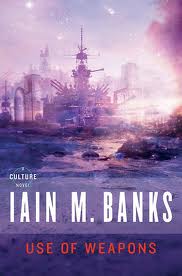The hours are counting down to the end of the year and I am taking stock of what I've read this year. There were plenty of really good books and a few that I enjoyed less.
Here are some of my favorites from this year. I would recommend you each and every one of these books. They are very different books spanning from hard sci-fi to fantasy to fiction, but they are all awesome and totally worth reading!
Here are some of my favorites from this year. I would recommend you each and every one of these books. They are very different books spanning from hard sci-fi to fantasy to fiction, but they are all awesome and totally worth reading!
- Among Others by Jo Walton
- To Say Nothing of the Dog by Connie Willis
- The History of Love by Nicole Krauss
- Use of Weapons by Iain M. Banks
- Doomsday Book by Connie Willis
- A Short History of Nearly Everything by Bill Bryson
- Of Blood and Honey by Stina Leicht
Next I crunched some number on the books I read this year. The total number is 32. This fell 10 short of my goal for the year mostly due to the reading hiatus I took in the fall. I also had a rather even distribution of the genres I've read this year. The two top genres were fantasy and mystery ties for the first spot with 6 books each. Next were science fiction and urban fantasy with 5 books each. Next followed fiction with 4 books, non-fiction with 3 books, short story anthologies with 2 books and one steampunk novel. I am pretty happy with this distribution, and especially with the fact that I've read 3 non-fiction books.
On the gender divide, it was an almost even split of 17:15 male to female authors of the books that I've read. I actually managed to meet my goal of reading 15 new-to-me authors this year, which I am excited about. I hope I will get to meet even more new authors in 2013. Finally, I also met the resolution of reading on book from before 1900 with Three Men in a Boat.
I've also made two other, non-book resolutions in 2012. The first one was to climb a 5.11b cleanly. I blew this one out of the water, no only climbing a 5.11b, but flashing a 5.11c and cleaning several others. This goal was a success and I hope to improve more in 2013. My second goal was to do 20 pull-ups and that was a failure -- I could finally manage a pull-up this year, but I can do 3 at most. Sigh. Pull-ups are tough!
For me, 2012 was a year full of ups and downs. On one hand I was sick a lot this year, with a bunch of unpleasant trips to the doctors and specialists. On the other hand my work has been going well, I've moved to a new nicer place, and I've got two adorable kittens. I hope 2013 holds all sorts of new and exciting books and life events both for me and you. Happy New Year!
.jpg)
.jpg)
.jpg)
.jpg)



.jpg)
.jpg)
.jpg)


.jpg)
.jpg)
.jpg)
.jpg)
.jpg)
.jpg)
.jpg)
.jpeg)

.jpg)
.jpg)
.jpg)
.jpg)

.jpg)
.jpg)
.jpg)
